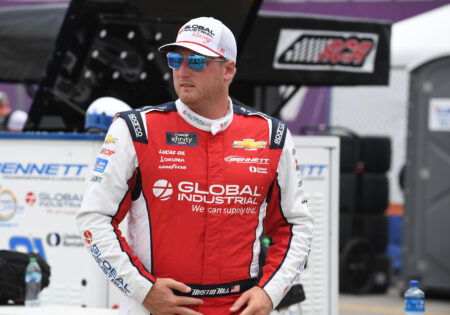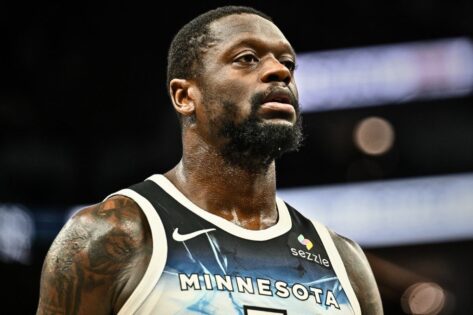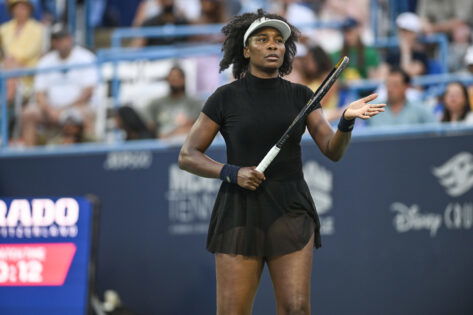Austin Hill’s return to the NASCAR Xfinity Series at Watkins Glen was anything but quiet. Coming off a one-race suspension for his controversial right rear hook at Indianapolis, Hill found himself in the middle of another high-profile incident, a 16-car pile-up sparked by contact with Michael McDowell. NASCAR officials ruled the wreck as a mirror racing incident, an aggressive move without malice, effectively acquitting Hill of further penalty.
While the wreck drew immediate scrutiny from fans and media, insiders framed Austin’s not as a reckless retaliation but as textbook hard racing.
NASCAR Insider categorizes Austin Hill after clash with Michael McDowell
Following a deliberate hook of Aric Almirola at Indianapolis Motor Speedway, caught on lap 92 of the Pennzoil 250, NASCAR issued a decisive penalty, a one-race suspension, and the forfeiture of all 21 playoff points, effectively cutting into Austin’s bid.
During the Iowa race, Austin Dillon stepped into the No. 21 car, and Hill became eligible only via a playoff waiver. The move sent a clear message: even with a reputation for hard racing, behavior perceived as intentional contact wouldn’t be overlooked. And now, as he was back in action at Watkins Glen last weekend, Hill battled Connor Zilisch and Michael McDowell for position.
Exiting Turn 5, Hill misjudged the merge and tapped McDowell, sending him into the Armco barrier. His airborne Chevrolet came down and sparked a 16-car pileup that triggered a red flag. McDowell, making his first Xfinity start since 2016, described the contact as aggressive and non-intentional. He emphasized that Austin had no room to complete the pass and chose not to lift, which caused the spin.
Importantly, he declined to demand further penalties, underscoring the difference between a road course tangle and an oval right rear hook. Post-race, NASCAR’s senior VP of competition, Elton Sawyer, confirmed that after reviewing telemetry and video, the incident did not warrant additional sanctions. He acknowledged hard racing and bad decisions but ruled no one had crossed into malicious intent.
And now, as NASCAR insiders scramble to make sense of this, one of them has bracketed drivers into categories based on their driving style. Speaking on Hauler Talks, Mike Ford, NASCAR communications director, weighed in saying, “So we’ve got the Austin Cindric bucket, we have the — let’s call it — the Bubba Wallace, Chase Elliott, Austin Hill right-rear hook at a high-speed track bucket, and then we have the Austin Hill, Connor Zilisch — which we haven’t talked about — and the Christopher Bell-at-Indy bucket of the non-retaliatory hooks that you see more often at superspeedways.”
Mike further added, “Like, two weeks from now in Daytona, we’re going to see this happen, and no one’s going to think about suspensions. We kind of look at it the same way as that. Those are a little bit of different buckets because it’s kind of the nature of the beast.”
Despite both being hypercompetitive rookies in 2025, Connor Zilisch and Austin Hill approached their battles with noticeably different styles. Zilisch, fresh off back-to-back road course victories, including Sonoma and a 2024 debut win at Watkins Glen, has a reputation for calculated aggression, steering hard but clean in high-stakes duels and often coming out on top thanks to smart execution.
In contrast, Hill returned from a one-race suspension, carrying the weight of that controversy into his Watkins Glen effort. While both drivers race hard, Connor’s maneuvers are often viewed as fierce yet measured, whereas Hill’s have occasionally tipped into poor execution, especially in the tight racing scenarios like the Glen.
Mike added, “Whereas my bucket at Indy — it was aggressive, trying to get the position, and hard racing with poorly timed moves — we put that in the “hard racing and poor execution” bucket.”
Looking ahead, a couple of weeks to Daytona International Speedway, a super speedway, where nonretaliatory hooks are almost a rite of passage move in the heat of competition. Christopher Bell, for instance, has built a reputation for hard passes without malice, aggressive but respectful. Austin Hill’s tangle at Watkins Glen, while causing chaos, falls under the same umbrella as these things happening in the push for position, especially on layouts with high-speed merges and narrow run-off transitions.
And now, with fellow drivers giving their opinion, including Denny Hamlin, Dale Jr. has come in packing with his no-nonsense verdict on Austin Hill and RCR.
Dale Jr. slams Austin Hill and RCR’s attitude
Dale Earnhardt Jr., a widely respected voice in motorsports, didn’t hold back when discussing what he sees as Austin Hill and RCR’s unwillingness to accept responsibility. In his view, both Hill and the organization operate from a belief that they’ve been wronged, framing themselves as victims of NASCAR’s rules rather than evaluating their own conduct. Junior described this as a deeply ingrained part of RCR’s culture, one that is unlikely to shift any time soon.
Speaking about their stance after the Indianapolis incident, Junior noted that neither Hill nor team owner Richard Childress seemed open to reassessing their approach. Instead, Hill’s already aggressive image appeared amplified following his suspension, as he had returned with a score to settle rather than a lesson learned. This, Dale Jr. suggested, reflects RCR’s long-standing ethos: to push back hard against perceived slights instead of bowing to outside pressure.
Speaking on his DJD podcast, he says, “Austin and them feel like they got dead wronged. Austin Hill did not come to the Glen with his tail between his legs and remorse. RCR didn’t, Richard don’t. Their mindset that ‘Y’all f—– us over, man, and y’all took our points and you’ve put us in this position where we’re gonna f—— come back swinging. Round 2, motherf—–, here it comes.”
In most cases, a major penalty or suspension prompts teams to instruct drivers to rein in their aggression to protect future results. RCR, however, has historically taken the opposite route. Junior says the team has long refused to shoulder blame, referring to doubling down when challenged. That refusal to back off has shaped both Hill’s and RCR’s responses in high-stakes situations.
Rather than tempering their approach, they reportedly intensify it, reinforcing a reputation built on confrontation and leaving little room for reconciliation or self-reflection.
The post NASCAR Insider Acquits Austin Hill of Watkins Glen Wrongdoing, Labelling It as Hard Racing appeared first on EssentiallySports.



